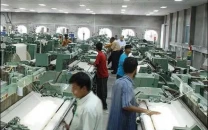Perpetuating mediocrity
Everyone in every sector is just perpetuating mediocrity.

The writer is former president of the Karachi Chamber of Commerce and Industry and tweets @MajydAziz

At the same time, the situation in state-owned enterprises faced the same predicament. Productivity was never an issue because of diverse reasons. The most explanatory reason was the influx of political appointees who considered their employment as secure and, therefore, they could nonchalantly take liberties with impunity. The management executives, too, were infected with political patronage and thus, their agenda was in tune with the dictates of their patrons rather than the viability or survivability of the enterprises they managed.
Moreover, in other sectors, such as education, health and even the legal profession, there is much to be said of the sad affairs of having people, who are unashamedly inefficient, ill-trained and unfit for the tasks allotted to them. Most of the one-star schools in Pakistan have teachers who are paid less than the legal minimum salary. This reflects the low calibre of the teacher and it is a shuddering consideration about the trained output from these schools. In many clinics and hospitals, the performance of the medical personnel leaves much to be desired. In fact, many of them are playing with the lives of patients who depend on them for their medical diagnosis and solutions. It is also a matter of concern when small-time lawyers and even petty magistrates write in an atrocious manner, literally massacring the English language.
Restaurants, bistros, cafes, and fast food joints have more employees than are usually prescribed for their establishments. The clear explanation is low wages, long hours and horribly high prices of their so-called delicacies. It is another story that in many such places, the servers, for example, cannot even properly pronounce the names of the dishes, what to talk about offering suggestions on the choices.
What do all of these examples reflect? Obviously, there is a common factor that loudly reverberates the truth. Remember the oft-repeated management advice, “Well, if you pay peanuts, you get monkeys”? That is one very evident answer. However, the prime reason is that in all that is happening, everyone in every sector is just perpetuating mediocrity. This is a manifestation of the inadequacies of the decision-makers themselves, too, and shows their own lack of ability. It becomes magnified when a time comes that mediocre people become invaluable to the organisation and start making and implementing their own decisions or directives. The outcome then is like that of a whirlpool that keeps on gathering momentum and gradually becomes a tornado of incompetence and ineptness. This is so much in abundance all over Pakistan. It is time to sit up and observe what Napoleon Bonaparte once stated: “When small men attempt great enterprises, they always end by reducing them to the level of their mediocrity.”
Published in The Express Tribune, June 25th, 2013.
Like Opinion & Editorial on Facebook, follow @ETOpEd on Twitter to receive all updates on all our daily pieces.












1726134115-0/BeFunk_-(41)1726134115-0-208x130.webp)



COMMENTS
Comments are moderated and generally will be posted if they are on-topic and not abusive.
For more information, please see our Comments FAQ